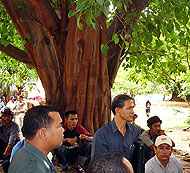Land grabbing in Cambodia leaves communities camping out on the government's footsteps waiting for justice
Published on 4 October 2006In the past four months, Phnom Penh has played host to several mass land evictions that has left many citizens living in squalor and struggling to survive. In particular the forced evictions taking place in the capital have occurred at Sambok Chap village, Preah Monivong AB Community and Village 15, all of which have relocated villagers to Angdong village, Angsnoul village and Damnak Trayeong village respectively.
In addition to the noticeable impact of Phnom Penh's evictions, land disputes have also become disturbingly problematic in the provinces. What Phnom Penh has been witnessing is the new phenomenon of increasing numbers of communities traveling into the city from their home provinces - some as far as Banteay Meanchey province 350km from Phnom Penh. The villagers, camped under the shade of a tree nearby the National Assembly, make the journey to Phnom Penh to lobby the government in the hope that they will address the land disputes in their home villages.
What often happens in these cases is that community members bring with them only what they are wearing and what little money they have for their long trek into the capital. Once in Phnom Penh they gather in large crowds outside the National Assembly and there they stand. Their vigil often draws attention from the media and the communities have an opportunity to advocate their cause to the public. However, there is hardly any response from the government other than from the police who may attempt to disperse the groups.
As they quietly demand justice on the government's footsteps, the communities wait with no essential food, shelter, supplies or access to sanitation. Some villagers are also disabled and find it difficult living under these conditions. The health risks and dangers that these individuals are willing to expose themselves to are evidence of their desperation and their plight. During these situations LICADHO has been regularly providing medical and material assistance giving emergency rations of rice, food packages, tents and medicines.
Since early 2006, LICADHO has documented the following communities from all regions of Cambodia as making the journey to Phnom Penh to protest for their land rights:
▪ Meley district district, Banteay Meanchey province
▪ Preah Netpreah district, Banteay Meanchey province
▪ Bavel district, Battambang province
▪ Kean Svay district, Kandal province
▪ Srey Ambel district, Koh Kong province
▪ Memoth district, Kompong Cham province
▪ Prey Nub district, Kompong Som province
▪ Phnum Srouch district, Kompong Speu province
▪ Samrong Tong district, Kompong Speu province
▪ Treng Troyeong district, Kompong Speu province
▪ Baray district, Kompong Tom province
▪ Kampong Svay district, Kompong Tom province
▪ Stung district, Kompong Tom province
▪ Seng Monorom district, Mondolkiri province
▪ Anglung Veng district, Oddur Meanchey province
Freedom of movement also denied
For the fortunate ones that make it to the National Assembly, there are those who find just getting to the National Assembly can pose a threat. On August 9, 2006, 300 villagers from Pun Sang commune, Angsnoul district just outside of Phnom Penh, attempted to make their way to the National Assembly. Earlier that week an elder from the community had apparently been arrested in connection to a long standing land dispute and their protest up to the National Assembly was in response to the local authority's refusal to free him.
Enroute to the National Assembly the villagers were blockaded by riot police in an outer suburb of Phnom Penh and were prevented from entering the city. What ensued was a violent clash between armed riot police and a mob of angry villagers. The police fired bullets into the air and severely beat several people, as the crowd retaliated by throwing stones and pushing one police car off the road. Overall 29 people were injured in the violence with those more seriously injured being treated by the LICADHO medical team.
Increasing health fears
What has become increasingly apparent is that these forced land evictions are leaving communities with no choice but to confront the harsh reality of their situation. The choice is either to accept nominal compensation and relocation to an inadequate and barely functioning site or to find ways to protest and fight for their land rights. However if villagers decide to pursue the second choice, past experience has shown that they will risk health and physical injury in the process.
The end result in this unfortunate situation is that the affected individuals will all suffer from basic health problems.
Since June 4, 2006 the LICADHO medical team has been actively providing health care to the estimated 1600 families from Sambok Chap village and the 168 families from Preah Monivong AB Community. The medical team has worked at the eviction sites and continues its activities at the relocation sites treating up to 100 patients per visit.
One of the main issues at the core of the land evictions is that the victims are further impoverished and have little recourse to medical care, especially at their relocation sites which are often too far from health centers. Most commonly at the relocation sites, there is no running water and electricity which leaves the villagers at high risk of diarrhea, skin infections, malnutrition and respiratory infections.
LICADHO continues to be deeply concerned for the health and living conditions of relocated villages. It also urges the Government and the National Cadastral Commission to reassess how it manages land evictions and land disputes and to do so in a transparent manner and in cooperation with local authorities and villagers.








